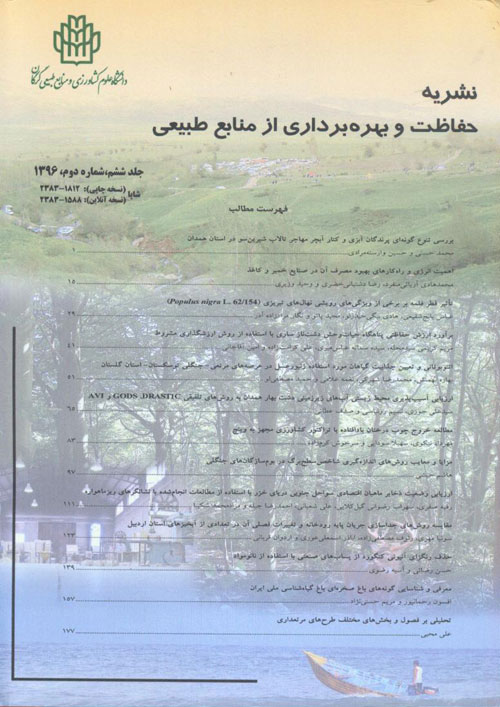Qualitative study of rural animal husbandry and indigenous knowledge in Ardabil province
Author(s):
Abstract:
Background And Objectives
After the nationalization of rangelands, the indigenous management practices have gradually disappeared and beneficiaries focused on overgrazing, which resulted in negative effects on rangelands and caused lose of rangelands wealth creation. Due to poor condition of rangelands and lack of ownership, beneficiarie's children do not have an interest in continuing their father's job. Lack of motivation of beneficiaries, lack of interest in younger generation as well as gradual elimination of indigenous knowledge and failure to transfer it to the next generation has caused a lot of damages to animal husbandry system. Actually, indigenous knowledge is experimental solutions earned by human over the years to solve the problems based on the past experiences. This knowledge is dynamic, tempered over time and has high efficiency. Therefore lack of awareness about it makes the proper implementation of animal husbandry in each region difficult and uneconomical. This knowledge is understandable, simple, and efficient, and is transferred orally; therefore, the lack of indigenous knowledge transfer will result in loss of a several thousand-year-old scientific treasure.Materials And Methods
The aim of this research was to qualitatively investigate the rural animal husbandry system and indigenous knowledge in the villages of Baghro region, Ardabil province. This research was aimed to investigate the efficiency of rural animal husbandry and to evaluate the beneficiarie's indigenous knowledge about proper range management and the transfer of this knowledge to the next generation. For this purpose the qualitative technique of focus group discussion, individual interview and observations were applied. Focus group discussion and individual interview were applied to collect indigenous knowledge. The interest of beneficiarie's children to continue animal husbandry and their indigenous knowledge were evaluated by observations and interviews. Overall, the knowledge of beneficiaries on rural animal husbandry was recorded with formation of 24 group sessions and 36 individual interviews during two non-continuous months (2013-2014) and the theory saturation stage was reached.Results
Results showed that indigenous communities have abundant and very useful scientific knowledge for range management among which not changing the pasture in the time of livestock mating, installing seed bags at the neck of male goats, having a right livestock composition in the herd, segmentation of pasture, rotation grazing and Preventing livestock grazing on steep slopes could be mentioned. Our results clearly showed that unfortunately most of young beneficiaries had little interest in continuing animal husbandry and they had learned less than a third of indigenous knowledge. Conclusion
Our results clearly showed that indigenous knowledge of beneficiaries in the studied area is acceptable and practical therefore animal husbandry system is qualified enough for proper range management. In addition, unfortunately, due to lack of interest in the younger generation to continue animal husbandry, the indigenous knowledge has remained in the heart of the older beneficiaries and is not fully transferred to the next generation. Therefore, this issue doubles the necessity of collecting and recording the indigenous knowledge of each region. Keywords:
Language:
Persian
Published:
Journal of Conservation and Utilization of Natural Resources, Volume:5 Issue: 1, 2016
Pages:
73 to 92
magiran.com/p1647715
دانلود و مطالعه متن این مقاله با یکی از روشهای زیر امکان پذیر است:
اشتراک شخصی
با عضویت و پرداخت آنلاین حق اشتراک یکساله به مبلغ 1,390,000ريال میتوانید 70 عنوان مطلب دانلود کنید!
اشتراک سازمانی
به کتابخانه دانشگاه یا محل کار خود پیشنهاد کنید تا اشتراک سازمانی این پایگاه را برای دسترسی نامحدود همه کاربران به متن مطالب تهیه نمایند!
توجه!
- حق عضویت دریافتی صرف حمایت از نشریات عضو و نگهداری، تکمیل و توسعه مگیران میشود.
- پرداخت حق اشتراک و دانلود مقالات اجازه بازنشر آن در سایر رسانههای چاپی و دیجیتال را به کاربر نمیدهد.
In order to view content subscription is required
Personal subscription
Subscribe magiran.com for 70 € euros via PayPal and download 70 articles during a year.
Organization subscription
Please contact us to subscribe your university or library for unlimited access!


